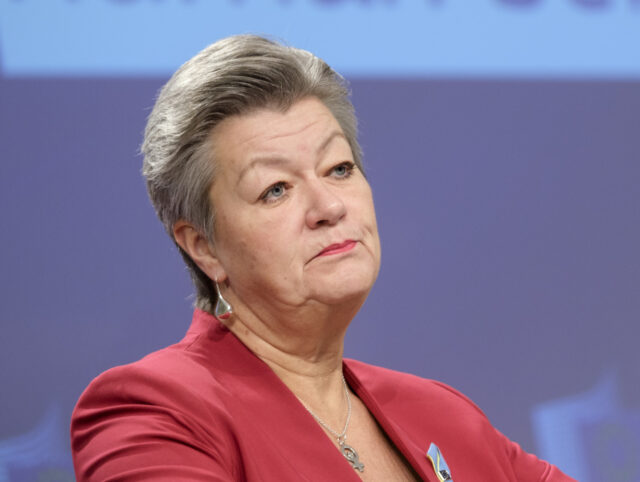The EU aims to increase its ability to deport illegal migrants, the bloc’s Home Affairs commissioner has claimed amid a growing wave of illegal immigration into the bloc.
Ylva Johansson, the EU’s Commissioner for Home Affairs, has claimed that the union is looking to increase cooperation with third-party nations in the hopes of making it easier to deport foreign migrants illegally residing within the union.
It comes at a time when illegal and uncontrolled migration into the EU is on the upswing, with there being over 275,000 illegal border crossings into the bloc recorded last year
To make matters worse, according to a report by Die Welt, many European nations are very reluctant to actually deport migrants within their borders, even when they have no right to reside there, with only around 23.3 per cent of migrants without a right to stay in the union being deported from the bloc in 2022.
Despite this sobering statistic, Johansson is reportedly optimistic that the EU will be able to better handle the crisis in the coming year, with the bigwig promising partnerships with African nations in order to make deportations easier.
“I expect that by the end of 2023 we will have turned things around in terms of repatriations,” the commissioner reportedly told the publication, pushing for a carrot-and-stick approach to be adopted.
“The EU, in cooperation with the International Organization for Migration (IOM), has set up projects for North Africa and the rest of the continent to promote voluntary return [of illegal migrants] and reintegration,” she reportedly continued, emphasising that she believed that a “common European approach” to the issue will help solve the crisis.
This would reportedly involve making legal immigration into the bloc easier, though it remains unclear whether more nationalist-leaning nations, such as Hungary and Italy, will agree to such a move.
She also claimed that the EU’s border agency, Frontex, would “significantly increase its support for return operations” over the coming year, which Johansson appears to believe will help curb the issue.
While the Home Affairs commissioner’s statement appears to indicate that the EU is paying more attention to the issue of immigration at a time when many populist and conservative parties are on the rise, it remains to be seen whether the relatively soft-touch approach actually gains any support from individual member states.
Though the approach of loosening legal immigration to curb illegal entries will no doubt be extremely unattractive to some EU members, for other more left-wing administrations the approach may still prove to be too harsh, with many countries within the bloc outright avoiding taking action against illegal arrivals.
For example, Ireland has seen the number of deportations it undertakes plummet since its current Justice Minister, Helen McEntee took over, with only five non-EU criminal migrants being removed under her tenure in 2021.
To make matters, many deportation orders are not directly enforced, with illegals instead being expected to “self-deport” without the involvement of the authorities.
Such a system means that authorities do not always know if someone has complied with the order, as there is often no easy way of verifying whether someone has actually left the country.
According to Die Welt, in the likes of the Czech Republic and France “there is apparently a lack of political will to actively deport illegal migrants”, an issue that will likely make it even more difficult to get the crisis under control.

COMMENTS
Please let us know if you're having issues with commenting.